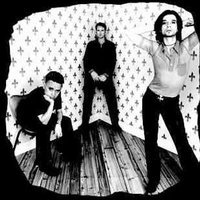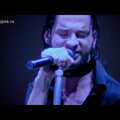DEPECHE Mode is a band of existential angst, pain, sadism, horror and darkness. There’s a communist aesthetic, a fascist element; no bubblegum. Everything is multi-layer, contradictory and ambivalent.
Not my words, but those of Richard Spencer, the American white nationalist who caused gasps and shudders last month – as the band were about to announce their Barrowlands show – with his claim that “Depeche Mode is the official band of the Alt-Right”.
The group were quick to disassociate themselves from Spencer and his politics. Their derision felt genuine, but so does his devotion. His favourite album, according to his Facebook page, is 1986’s Black Celebration, released when he was seven years old, although he has a lot of time for 1983’s Construction Time Again, in particular the single Everything Counts. One might hope that the line, “See just how the lies and deceit gained a little more power” would have some uncomfortable satirical bite for Spencer in the age of Trump, but perhaps not. If the whole unseemly incident proves anything, it is that everyone keeps faith in their own version of Depeche Mode.
“It’s really hard to express how much Mogwai love Depeche Mode. It’s beyond language,” says the Glasgow band’s Stuart Braithwaite. “I think they might have written some of the best pop songs and most powerfully anthemic pieces of music of any band. They’re an important group. It’s going to be amazing to see them at the Barrowlands, probably my favourite venue in the world.”
The gig at the venerable Glasgow concert hall sold out in minutes; hardly surprising given that their only other British date is the 60,000-capacity London Stadium and that they last played Barrowlands (having made the leap from Tiffany’s) in 1984, back when they were deep within their M&S-meets-S&M phase, and their big new track was Master and Servant. This time, it is likely that Just Can’t Get Enough, if they play it, will be the song of the night, given its adoption as a terrace anthem by Celtic fans. In that particular venue, in that part of town, it should be quite a moment – a cultural collision to shake floors and walls and bones.
The Kilts are a sort of auxilliary force of the tartan army, forever popping up, pint in hand, in post-Soviet capitals. That the Barrowlands show coincides with a World Cup qualifier against Slovenia means that Pollard will miss his first Scotland home game in 21 years. They wear black (though not leather) kilts while painting the town red, and have formed swallied alliances with similar groups of fans from other countries – “the mad Danes, the Irish mob, the Black Swarm from Germany”. Pollard is more interested in the live experience than in collecting memorabilia, “but I did once try to buy Alan Wilder’s jacket. The auction was on while I was watching Scotland beat Lithuania 1-0 at Hampden. I got some bids in before I lost signal.”
A few months ago, I was in London in a part of the South Bank where streets are named after Dickens characters. On Copperfield Street, I chanced upon an old church – All Hallows – deconsecrated and shuttered, ivy growing over the wooden, weatherbeaten figure of Christ crucified which was cemented into a concrete plinth. This, according to a sign pinned to a “Church Notices” frame, was once the home of Blackwing studios, where, in 1981, Depeche Mode recorded their debut album, Speak & Spell. Press an ear to the locked door, and you can almost hear the fading chords: new sounds, new life, ghosts of synthpop past.
Depeche Mode were, back then, just kids. A short film of the time shows them fresh-faced in Blackwing, working on an evangelical song (most of them came from a faith background) and later sitting at the foot of the crucifix for a discussion of their cultural moment. “Depeche Mode,” explains the narrator Danny Baker, “show how much futurism has changed now it has hit Essex.”
Remarkable that this very English confection should have become so popular in America, and yet – as documented in DA Pennebaker’s documentary 101 – that is exactly what happened.
Lori Majewski, the US author of Mad World: An Oral History Of New Wave Artists And Songs That Defined The 1980s, saw Depeche Mode for the first time at Christmas 1987 in Madison Square Garden. She had fallen for them hard. “Their songs spoke directly to the teenage heart,” she recalls. “I remember I had been in gym class in school and the girl sitting in front of me had a shaved head and this Black Celebration T-shirt on. Oh my God, I just wanted to be her. So I started taking pictures of Dave Gahan to my barber where I’d get my hair shorn like his. And I only wore black from then on.”
What was it like being a massive Depeche Mode fan in Auchinleck? To wear black nail varnish in a community with coal dust under its fingernails? “As far as I was concerned, no one else knew what I was going through. It was almost like a parallel with being gay. ‘Nobody understands! Nobody gets me!’ I got called a poof at school just for wearing a band T-shirt. I used to laugh that off.”
He would wander in the fields near his home, walking his dog Ben, listening to Shake The Disease. Fed up being the only fan in the village, he put a personal ad in Smash Hits (“If you’re aged between 1 and 101, get writing to Ian Jnr”) and ended up with 25 pen pals around the world. Having come out as a Depeche Mode obsessive, he felt able, in his letters, to start telling people he was gay. It is just one of the many ways in which the band have shaped his life.
In the hospital, at his dad’s bedside, in the last days, Morrison learned that a friend had managed to get him a ticket for the Barrowlands show. He texted back that he was excited, but in truth he didn’t feel anything.
Now, though, with the funeral over, and staying with his mum for a few days, the longest period he has spent in Auchinleck for 25 years, Morrison has had time to reflect on the the band, his father, his love for both, and how linked they are in his mind.
“He ran me to so many gigs, and so I take a wee bit of comfort that he’d be happy I was going to this concert,” he says. “If this was the last time I ever saw Depeche Mode, I’m sure I could live with that.”
Depeche Mode play the Barrowlands, Glasgow, on March 26 as part of the BBC6Music weekend in the city. The Kilts are hosting a pre-show party at the Solid Rock Cafe, Hope Street, Glasgow, from 2-6pm.



